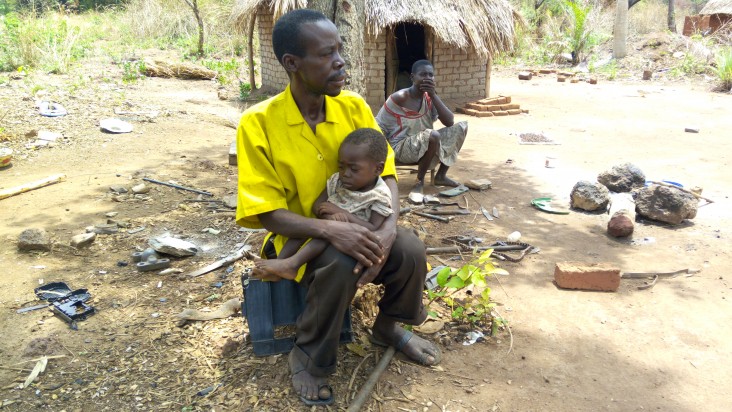
June 2017—Mercy Edward was pregnant when fighting erupted near the home she and her husband Abraham Charles Zinone shared in Western Equatoria, South Sudan, in May 2015. The civil war that began in the capital, Juba, in December 2013 had now spread west.
Both Edward and Zinone are HIV-positive. Edward is also epileptic. To save their lives and their unborn baby, they fled to the neighboring Central African Republic, a country that was also embroiled in violent conflict.
After walking five hours, they crossed the border and settled in with other South Sudanese refugees under trees and simple shelters built with natural materials gathered in the bush. Soon after, Edward’s water broke. Without any skilled health provider to assist her, she delivered a baby boy with help from Zinone and fellow refugees. They named their son Abraham Junior.
They survived on wild plants and fruit, but had no materials to plant crops. After a year surviving these conditions, the family returned by foot to South Sudan.
With no access to health care or antiretroviral (ARV) medication during the year they were in the Central African Republic, Edward’s health had worsened. Her epileptic seizures became more frequent. Meanwhile, combatants looted the Source Yubu Health Center the family had depended on for health care, rendering it inoperable.
Abraham Junior also became ill and needed urgent care. He had a severe cough and was pale and weak. Zinone was faced with the threat of his son dying.
“I had been struggling with my wife’s and child’s sickness and getting in the facility, but when I heard [project services were] in Kpotonayo, I said, ‘Let me try also going for medical assistance,’” said Zinone, recalling how he learned of USAID’s Strengthening the Provision of Primary Health Care project, supported through the U.S. President's Emergency Plan for AIDS Relief, which USAID health partner Jhpiego was operating 3 kilometers away. The project provides ARVs free of charge to those who have HIV and need medication.
The staff thoroughly assessed 22-month-old Abraham Junior’s health, which included an HIV test that showed he was HIV-positive. His health was further complicated by poor nutrition, poor sanitation, and infection due to reduced immunity. The health care team devised a comprehensive health management program for Abraham Junior, including oral rehydration, iron supplements, treating opportunistic and parasitic infection, and nutrition counseling for his parents. Zinone and Edward also received care and replenishment of ARVs.
The medical care was successful: The family’s health improved.
“Since we started taking our ARVs the way [the project health provider] advised us, my wife is now okay and the boy is able to walk, and he is even eating well,” said Zinone.
During a follow-up visit to Source Yubu in March 2017, Jhpiego HIV case manager Rebecca Apio noticed that Abraham Junior had missed an appointment. She and her colleagues set out to find the family in the village.
Zinone had gone out to work to make ends meet for his family and missed the appointment. During a home visit, Apio and her colleagues assessed the progress of the family’s health and provided them with health counseling, ARVs and, for Abraham Junior, nutritional supplements.
Zinone, Edward and their son are among more than 70,000 people in South Sudan who have been tested for HIV and provided health education, including family planning, from the project since it started in June 2015. More than 2,000 clients have tested positive for HIV and started ARV care, including approximately 1,500 pregnant women. Without the project, they would likely be unaware of their HIV status and at risk of illness and early death. The project has also provided more than 40,000 women with antenatal care.
“Thank you very much for your assistance and coming to see us at home. I am working hard to help my family so that they get something to eat,” said Zinone.
LINKS
Follow @USAIDSouthSudan, on Facebook, on Flickr







Comment
Make a general inquiry or suggest an improvement.